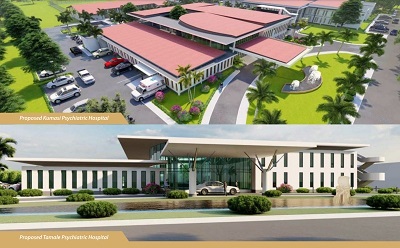Agenda 111: Potential impetus to health growth

A few days ago, the country witnessed a sod-cutting ceremony at Trede in the Atwima Kwanwoma District of the Ashanti Region to put up the construction of 111 regional and district hospitals to make Ghana emerge a country with excellent health facilities, the best in the sub-region of West Africa, to prove in practical terms that our lovely country is ready to let the world see how determined it is to lead the way to progress.
Of the 111 hospitals being constructed, 88 are district hospitals while the remaining 13 will represent regional hospitals with two others being specialised hospitals for psychiatric purposes for the Northern and Middle Belts.
In fact, this is the largest investment ever made in the medical history of Ghana since independence and having been carried out by President Nana Addo Dankwa Akufo-Addo, the country salutes this noble man for his vision and foresight.
On the face of it, many people will not see the health significance of this huge project and its relationship to economic growth in the country. It is, therefore, important for us to examine the relationship between this project and potential economic growth of the country.
MEANING OF HEALTH
Health does not necessarily refer to the absence of disease, according to the World Health Organisation (WHO). Indeed, the absence of diseases may be important but good health depends on that we find ourselves in a situation where people will be able to enjoy the peace to create activities that lead to socio-economic development in their lives and in the nation. This means that if people are hindered by obstacles that make it possible for them to promote development in their lives, the state of health cannot be said to be good.
There is no doubt that the state of health impacts economic growth in several ways. In the first place, when hospitals exist to cater for the health needs of the people, it makes them healthy and strong to increase productivity. Good health, due to productivity of hospitals, reduces illness on the part of people and enables them to get better nutrition following the guidance given them by the hospitals through quality medical care. This helps to lower absenteeism on the part of workers.
Apart from this, it helps to improve the state of absenteeism on the part of school children, leading to better learning and stronger population. Again, the absence of enough hospitals often leads to increasing illnesses that cannot be easily addressed due to the absence of medical facilities. As a result, efforts are made in form of alternative financial investments for the treatment of the sick population.
ENOUGH HOSPITALS
The availability of enough hospitals in the districts and regions would have made it possible for such investments or financial resources to have been used for alternative projects that could have stimulated a higher rate of socio-economic development. Thus, the 88 district hospitals under construction together with the other 13 regional hospitals including those for psychiatric purposes are meant to promote socio-economic development directly and indirectly in the country.
By implications, therefore, the state of health in a country affects economic growth through productivity of labour. When people fall sick and cannot be treated by reliable medical facilities, it means that the economic burden of illnesses will thwart every effort being made for greater productivity as well as general growth in the economy. If, for example, the health of children is negative due to frequent illnesses in areas without health facilities, the burden of child health will affect the future income of people through the impact health has on education.
Here, the children will not be able to go to school regularly and the financial burden incurred by parents will adversely affect the trend of education in the country. If the trend of education is affected in this way, what it means is that the quality of population produced for the future will not be able to live up to expectation in terms of excellent labour force and high productivity.
INDIRECT IMPACT
This indirect impact is easier to understand if it is observed at the family level. By way of illustration, if a family is healthy, both the mother and father can concentrate on their jobs and earn some money which will allow them to feed and protect the family. In the same way, it will empower them to send their children to school. Ultimately, therefore, healthy and well-nourished children will be able to perform better in school. As these children perform better in school, they will be able to prepare themselves positively for higher or better income in future.
What this means is that if parents can envisage that their children have a high probability of reaching adulthood, they will give birth to fewer children and be able to invest more in terms of time and effort in their health and education.The point being made is that when families suffer from poor health leading to loss of children through death, they decide to have many children so that after a few deaths, some of the children can remain as human assets for their parents.
It is for this reason that in the past, in many farming areas, many parents gave birth to many children so that after a few deaths some of them would be available to help them on their farms. This means that there is a link between availability of medical facilities and the social norms and values of societies. Thus, the construction of the 111 regional and district hospitals, thanks to President Akufo-Addo and his administration, has a huge positive implication for the country’s socio-economic development and should, therefore, not be taken for granted. In other words, families with good health will not necessarily have to bring forth many children and the few children brought forth will not place huge economic burden on the state, thereby accelerating the rate of socio-economic growth.
88 HOSPITALS AND MORE
It is good that the construction of the 88 district hospitals has begun with the sod-cutting by the President a few days back. Indeed, the construction of the regional hospitals, like the district hospitals, is also dependent on the availability of suitable land for that purpose and their construction will begin towards the end of the year as indicated by President Akufo-Addo. The good news is that each hospital will be a modern state-of-the-art single-storey health centre, featuring patient reception and processing area, administration, pharmacy, laboratories/diagnostics, physiotherapy, public health, accident, and emergency facilities.
BIGGEST HEALTH INVESTMENT
As already indicated, this would be the biggest investment in health care in the country and for this reason, they should be monitored on continuous basis by the districts through the District and Metropolitan Chief Executives, whether already on the job or will be in-coming new executives. The regional hospitals, when they also begin later, should be closely monitored by Regional Ministers so that regular accounts on progress of work can be given to Ghanaians who happen to be the chief stakeholders in this enterprise.
President Akufo-Addo and his administration mean business so the entire nation must give them, but not listen to desperate propagandists in the country, the support needed to propel Ghana to a higher pedestal of socio-economic development.
Contact email/WhatsApp of author:
Pradmat2013@gmail.com (0553318911)
#########











